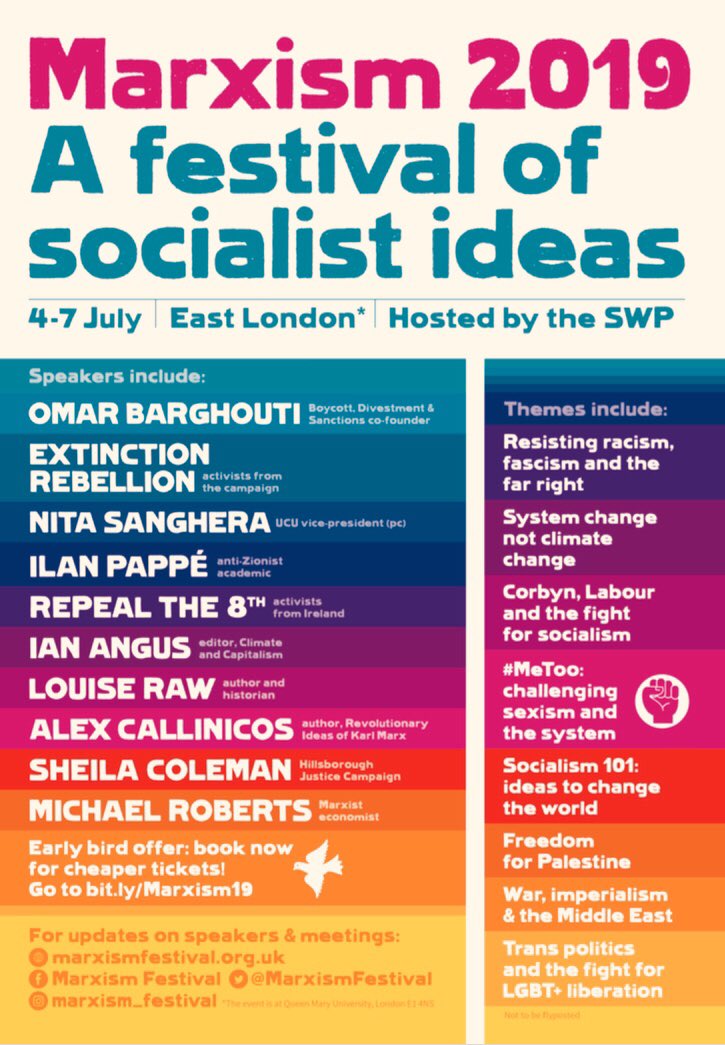
Marxism 2019 - A festival of socialist ideas - 4-7 July, London
Capitalism is in crisis. Society is rapidly polarising between Left and Right. Marxism Festival 2019 is the place to debate how we can beat back the rise of racism, fascism and the far right. But thousands of people from around the world will also be discussing the alternative to the system that means chaos.
Speakers include:
Omar Barghouti • Extinction Rebellion • Ilan Pappé • Louise Raw • Ian Angus and more!
For more information and how to book see here
-----------------------------------------------------------
Historical Materialism Sixteenth Annual London Conference 2019
Claps of Thunder: Disaster Communism, Extinction Capitalism and How to Survive Tomorrow
Central London, 7-10 November 2019
https://conference.historicalmaterialism.org/index.php/hmlondon/annual16
Call for Papers, Deadline 15 May 2019
For all queries, email only please: historicalmaterialism@soas.ac.uk
Humanity faces an unprecedented crisis in the conditions for its long-term survival. The planet has warmed before, but never this fast. Mass extinction is a regular geological event, but it is now happening faster than at any time since the Cretaceous-Paleogene extinction: a megaphase crisis in microphase time. And humanity has never before faced the comprehensive exhaustion of top-soil fecundity.
The emerging forms of authoritarian reaction are characteristically denialist about this catastrophe, from Trump’s Sinophobic conspiracism to Bolsonaro’s efforts to extirpate the landless workers’ movement. But the dominant response of fossil fuel giants is that of the majority of capitalist sectors and liberal states: to embrace ‘green’ capitalism, carbon markets, carbon taxes, and green technologies, whose total effect is to lock in carbon emissions. The Pentagon positions itself as an ally against climate change while securing the conditions for the efficient exploitation of oil and gas concealed under thawing Arctic ice. Environmental movements have coalesced and dispersed since the Seventies, but have hitherto lacked the structural, disruptive capacity, and perhaps also the strategy, to achieve the depth and scale of social transformation necessary to slam on the brakes of the crisis.
The roots of this ongoing disaster are social. The very evolution of fossil fuel use is linked a growth paradigm based upon the imperatives of capitalist accumulation ever since the beginning of the ‘industrial revolution.’ Advocates of ‘green capitalism’ have failed to offer a plausible solution to a catastrophe that is more imminent than ever. Any attempt to avert climate change requires a mobilisation of resources and a profound change in production and consumption forms that are incompatible with capitalist social relations of production. But even if such an attempt is launched tomorrow, we are likely to face a long-lasting legacy of damages to the earth system
How does communism fare in a world thus despoiled? What alternatives to the various miserable endgames mapped out for us by capital can Marxists envision? What new configurations of agency, strategy and vision are necessary for human emancipation and survival? Beyond denialism, how do we avert the potential for new climate-driven security regimes, eco-Malthusian crackdowns on the poor, and murderous eco-fascism?
This is the overarching theme for this year’s Historical Materialism Conference. We welcome papers on:
• Relationships between climate change, mass extinction and capitalism, and the consequences of ecological deterioration for the long-term reproduction of capitalism, the organisation of capitalist states, the viability of capitalist democracy, and new axes of imperialism.
• Potential for new modalities of racial capitalism, or a new form of ‘climate sovereign’ or ‘climate Leviathan’, to emerge around the militarisation of climate policy under the rubric of ‘natural security’.
• Commodification of climate change, as for example with the pursuit of carbon markets, ‘green capitalist’ technologies, and the opening of the Transpolar Sea Route and the military struggles for control over it.
• History of environmental struggles, from Bhopal to the Dakota Access Pipeline, the sometimes ambiguous role of the organised working-class therein, the salience of anti-racist and anti-colonial movements, and the ideological contest between various registers of ecological thought including eco-socialism, eco-Malthusianism, Deep Ecology, black ecology, the environmentalism of the poor, and eco-fascism.
• Popular militancy, denial, apathy, anger and ‘melancholia’ in the face of climate crisis, and the ideological or psychoanalytic bases thereof.
• Emerging forms of climate reaction, from libertarian strategies of denial/affirmation, to eco-fascist Arcadias based on racist genocide.
• Ecological and political viability of strategies of mitigation — from Green New Deals to geoengineering to ‘half-earth’ strategies — and the meaning of any plausible scenario of communist plenty in a de-carbonised future.
• The recent ecological reformulations of historical materialism, the relevance of Marxist categories for analysing the geological scales of ‘Deep Time’ on which the climate crisis is predicated, and the relationship between Marxism and the ‘hard sciences’.
The conference will also include streams on Marxist Feminism, Race and Capitalism, Work, and Sexuality and Political Economy (all to follow), but also open CfPs for paper/panel proposals that look at utopia and postcapitalist futures, the political struggles over sovereignty, the second wave of Arab uprisings and the capitalocene, Marxism and literature. In addition, the conference will, as always, be open to proposals not directly related to the main theme on all areas of Marxist and left-wing thought and politics, including political economy, political science and state theory, history and historiography, philosophy, law, cultural and aesthetic theory, science studies, and any other relevant discipline.
Please Note: Although we welcome preconstituted panels, after extensive feedback from previous years we are tightening up on panels with just titles or incomplete names. Panels should provide title, abstract and full names, emails of each participant and abstract/note of contribution (where relevant). Incomplete panel proposals will be put on the reserve list and may ultimately be rejected. We also reserve the right to reject certain papers in a preconstituted panel and to reconstitute panels as we see fit.

No comments:
Post a Comment